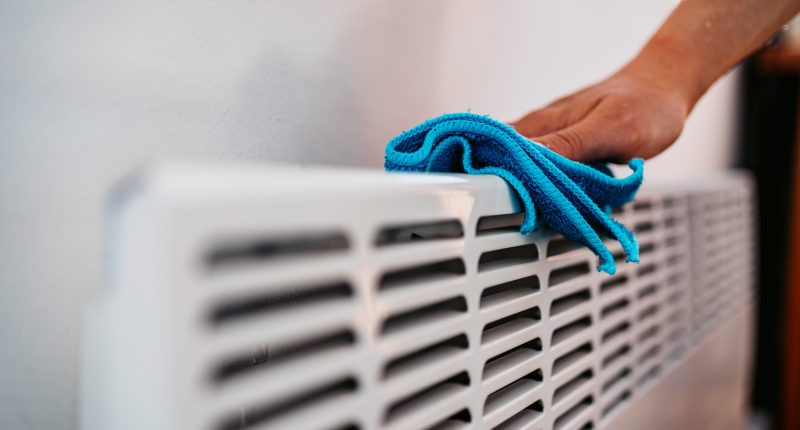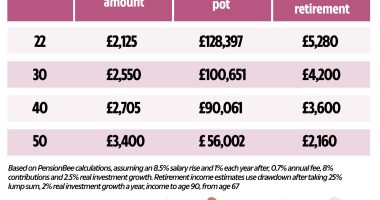ANYONE planning a quick spring-clean of their radiators should be wary of making one specific mistake.
Keeping the appliances free of dust and dirt helps to keep heating costs down, even if you’re using them less right now than during the height of winter.
This is because dust on a radiator can prevent heat from escaping, meaning it has to work harder to warm the room it’s in.
But if you’re looking to give yours a quick once over to make sure they’re in maximum working order, there’s one mistake you’ll want to avoid, according to heating technology expert Jess Steele from BestHeating.
Using anti-bacterial products such as aerosols and sprays can pose a huge fire risk, particularly if your radiator is already on.
This is because the chemicals inside the products react to heat and in a worse-case scenario can explode.
Read more in Energy Bills
According to Checkatrade, the cost of replacing a large radiator is around £300, and that’s before considering the cost of repairing any added damage an exploded radiator might have done.
Instead, Ms Steele said, use a hairdryer and towel to remove any dust build-up to get your radiator working more smoothly.
If you’ve got a convector radiator, you can use a brush to get rid of any dust in between the fins too.
She explained: “To effectively clean the radiators without danger I would recommend first ensuring that your radiator has been turned off for at least two hours, which is much more easily done during spring or summer as they aren’t generally in use.
Most read in Money
“Then, use a hairdryer to remove any dust build up, and to push any remaining dirt trapped inside, place a towel underneath your radiator and use a long thin cleaning brush to get between the fins.”
Other cleaning techniques to avoid
Steer clear of cleaning your radiators with coarse materials which can damage the surface and remove paint.
Ms Steele said: “When cleaning the exterior of your radiator be careful using abrasive materials like Brillo pads, which may scratch and damage the surface and even remove paint.
“If you notice stubborn stains on your radiator, leave a spray solution on for a few minutes longer than normal and wipe it away with a cloth or a sponge.”
Make sure you check any cleaning products for corrosive chemicals that can damage your radiators too.
Common household items like bleach can shorten the lifespan of a radiator if left to work away at the surface.
Ms Steele said: “I would suggest avoiding bleach at all costs as the harsh chemicals can deteriorate the quality of the metal over time, and for those with coloured radiators, using full strength bleach could permanently damage the paint and fade the colour.
“For a streak-free finish on metal surfaces, try diluting white vinegar with water before buffing it onto your radiator.”
How else to save money on energy bills
You may not be blasting your heating on as much during the summer, but you could be racking up your bills in other ways.
Most households turn to fans during a heatwave, but the devices can be costly to run.
Instead, save a few pennies by having it on for less hours throughout the day, or opting for another option such as a cooling mat which costs nothing to run and can cost as little as £5.
We reviewed a cheap cooling mat last year and found it helped with sleep during summer.
How do I calculate my energy bill?
BELOW we reveal how you can calculate your own energy bill.
To calculate how much you pay for your energy bill, you must find out your unit rate for gas and electricity and the standing charge for each fuel type.
The unit rate will usually be shown on your bill in p/kWh.The standing charge is a daily charge that is paid 365 days of the year – irrespective of whether or not you use any gas or electricity.
You will then need to note down your own annual energy usage from a previous bill.
Once you have these details, you can work out your gas and electricity costs separately.
Multiply your usage in kWh by the unit rate cost in p/kWh for the corresponding fuel type – this will give you your usage costs.
You’ll then need to multiply each standing charge by 365 and add this figure to the totals for your usage – this will then give you your annual costs.
Divide this figure by 12, and you’ll be able to determine how much you should expect to pay each month from April 1.
Spring and Summer is also the perfect time to ditch your tumble dryer and use a washing line instead.
One of the energy-guzzling appliances costs around £1.35 to use for two hours, which if used regularly, can add up fast.
READ MORE SUN STORIES
Hot weather might have you jumping in the shower more often too, but try limiting your water usage as that can bring down costs.
Reporter Lynsey Hope slashed the length of her and her family’s shower times to four minutes and made a £11.45 weekly saving – worth almost £600 a year.
Do you have a money problem that needs sorting? Get in touch by emailing [email protected].
Plus, you can join our Sun Money Chats and Tips Facebook group to share your tips and stories.










